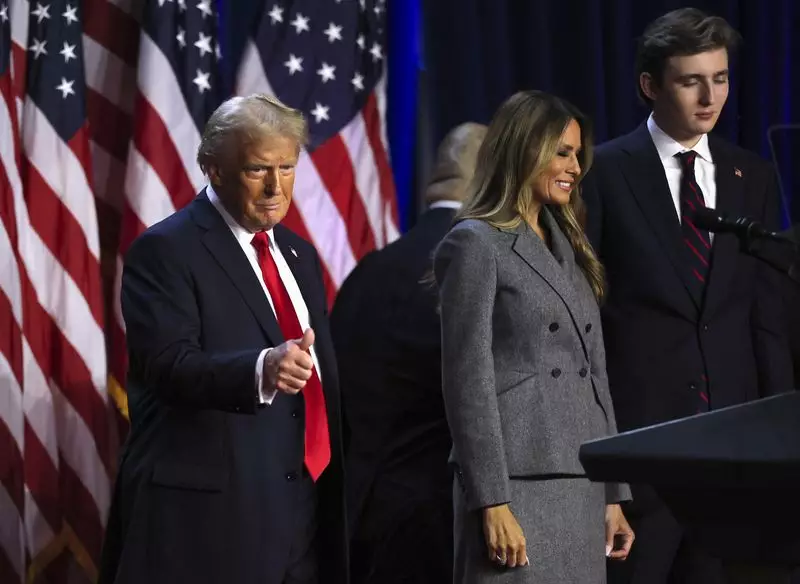The announcement of Donald Trump’s presidential victory signals a new chapter in the dynamic and often tumultuous relationship between the United States and China. As the Republican Party regains control, the ensuing policies and strategies employed by the Trump administration could significantly affect global trade, technology, and geopolitical stability. With Trump’s previous term marked by aggressive stances on these fronts, experts predict another period of intense rivalry between the two superpowers.
Trump’s election outcome, where he garnered a larger proportion of the vote than in 2016, indicates a solid backing that could embolden his administration as it approaches its foreign policy agenda. Analysts have noted that despite the challenges posed by his leadership style and policy decisions, China had anticipated a competitive electoral landscape. This insight suggests that China has been preparing for diverse scenarios, strategically navigating the potential implications of Trump’s policies.
As expressed by Tong Zhao of the Carnegie Endowment for International Peace, while Trump’s victory isn’t China’s preferred scenario, it provides an opportunity for Beijing to manage its diplomatic relations carefully. By fostering a facade of cordiality with Trump, China may seek to enhance its international standing while subtly amplifying its own power agenda. The Chinese leadership is keenly aware that engaging with the unpredictable nature of Trump’s presidency requires agility and strategic foresight.
One of the most pressing concerns for Chinese leadership lies in Trump’s proposed tariffs on Chinese imports, which could exceed 60%. This level of economic pressure poses a direct threat to China’s expansive trade relationship with the U.S.—a relationship worth over $400 billion annually. With a significant reliance on exports to the United States, analysts are concerned that heightened tariffs could devastate China’s economy, especially as the nation grapples with its own internal challenges.
Zhao highlights that under Trump’s leadership, China anticipates a revival of previous trade wars, which could entail a decoupling of technology and supply chains that are critical to its economic growth. In response, China is expected to escalate its efforts toward technological self-sufficiency, driving initiatives that enhance domestic innovation while also strengthening alliances with countries like Russia.
Additionally, experts like Brian Wong from the University of Hong Kong propose that China will actively seek to define clear strategic exchanges and partnerships with Washington, aiming to focus on its pressing domestic economic needs while diverting Trump’s attention elsewhere.
If Trump adopts an isolationist approach, experts suggest this could create an important vacuum that China could exploit to extend its influence globally. Wong points out that, under Trump, the U.S. may prioritize transactional relationships at the expense of multilateral agreements, giving Beijing potential leverage to engage more deeply with emerging economies and foster alliances that strengthen its global foothold.
Highlighting recent diplomatic maneuvers, China has made strides to mend strained relations with countries like India and Japan, signaling its desire to broaden its influence in regions that align with its strategic interests. As China navigates its approach to international partnerships, the potential for enhanced collaboration with the Global South and European nations looms large.
One region that could experience heightened tensions as a result of Trump’s administration is Taiwan. Historically, the U.S. has maintained a complex relationship with the island, yet recent actions suggest an increasing commitment to Taiwanese defense. Trump’s stance has already made waves, particularly in the context of Taiwan paying for American defense services and acquiring U.S. semiconductors.
Shen Dingli, a noted scholar in Shanghai, underscores the concern that a return to an aggressive posture from the U.S. towards Taiwan could elevate regional tensions in East Asia. With the Biden administration expanding military engagements with Taiwan, the future trajectory of U.S.-China relations becomes even more precarious, as both countries navigate their economic, technological, and territorial ambitions.
As the U.S. reinvigorates a contentious political climate under Trump’s leadership, China is poised for significant challenges but also boundless opportunities. With a strategy potentially focused on consolidating power internally, China faces a turning point in its approach to engaging with the United States and the wider global community. The international landscape will undoubtedly shift, and the way both superpowers navigate their rivalry will shape the world in the years to come.

